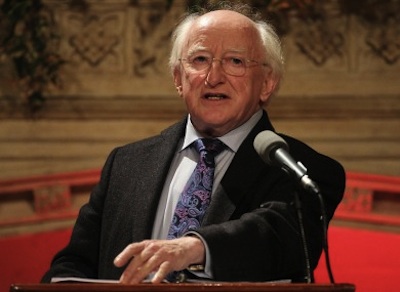
President of Ireland Michael D Higgins has joined the growing campaign in Ireland against the austerity agenda, with comments directly critical of the decisions being handed down by European leaders and the European Central Bank.
The unusually forthright and political statements by an Irish president have raised questions over whether they are in line with the constitution, which sets strong limits on the role and powers of of the President.
In the interview in yesterday’s edition of The Financial Times newspaper, Mr Higgins was expressly critical of EU leaders and the European Central Bank (ECB).
He took issue with the failure of EU leaders to fulfil their pledge almost one year ago to break the link between bank and sovereign debt.
“It would have been of immense benefit naturally to growth, employment creation and investment if the ... commitment of separating banking debt from sovereign debt had in fact been implemented,” Mr Higgins said.
“It would give you the opportunity to breathe and create growth in the economy.”
Stating that Europe faced a “moral crisis” as much as an economic crisis, the President said there was a need for “radical economics” and a “radical rethink” of how EU leaders were handling the economic crisis.
He also questioned Europe’s basic economic model and criticising the the EU’s “single hegemonic model”, calling for “a pluralism of approaches”.
Ireland was unusual in its acceptance of such a high degree of cuts when compared to other eurozone countries, he said, suggesting the Irish people had been unusually subservient to the directives of Germany’s Angela Merkel and the EU technocrats.
“The polite version is that we are pragmatists,” Mr Higgins said. “What we really need now is something that goes beyond outrage and recrimination.”
There has been increasing frustration in Ireland at the effects of the austerity policies and its effects on the economy, although largely without the dramatic street confrontations seen in other EU countries.
Last week, the Minister for Social Protection Joan Burton, who has implemented social welfare cuts every year since taking office, told an annual conference of the St Vincent de Paul charity that she believed “we have reached the limits of austerity now”.
After hearing accounts of widespread and increasing hardship, she said that ordinary people “are shouldering too much of the burden”.
She and other Dublin government officials have largely avoided public blame for pursuing severe budget cuts, year on year. However, despite this, the coalition government continues to implement economy-crushing policies, and emigration has again reached a new post-Famine high.
PROTEST
A protest in Cork this week at the high salaries still being paid to officials in the state owned banks (reaching [euro]843,000 p.a. in the case of Bank of Ireland chief Richer Boucher) ended with a number of arrests.
Councillor Mick Barry of the Socialist Party and Councillor Ted Tynan of the Workers Party were among five people arrested for public order offences when they refused to vacate the Bank of Ireland branch on Patrick Street despite being asked to do so by gardai who were called in by bank management.
The same state banks and the Minister for Finance Michael Noonan again infuriated the public this week when they opted to increase their take from struggling home-owners and other ordinary borrowers by refusing to pass on the latest cuts in ECB base interest rates.
Speaking in the Dail on Thursday morning, Sinn Fein Deputy Leader Mary Lou McDonald TD said “austerity is not working” and called on the government to reverse savage budget cutbacks.
“Yet again this government has had to revise down growth forecasts and revise upward unemployment projections,” she said.
“Right across Europe people are waking up to the reality that austerity is not working. Citizens out there in the real world have been pushed to breaking point and now you tell them that there’s two more years of austerity on the way. Even our own President has called time on austerity.
“The stealth taxes, the family home tax, the cuts to child benefit, the taxing of maternity benefit have a real impact on low and middle incomes families. People need to be given a break.
“If the state is due to meet the deficit targets with a billion or more to spare then this money needs to be used to ease the burden on citizens.”
She told the Tanaiste, Labour leader Eamon Gilmore: “Your economic approach is dramatically failing ordinary people.” She said the 19% cut in the Respite Care Grant, undermining the care of Ireland’s elderly and dying, was one of the most savage and mean spirited cuts in the last Budget.
“A cut that was to save the state only [euro]26 million but caused huge hardship to the 70,000 families who receive it.
“People need a break and if you have the opportunity to reverse this cuts to people with disabilities and the people who care for them I can’t for the life of my understand why you won’t do it?”
“It’s not working for the 430,000 or so who are unemployed. It’s not working for the many families out there who have sons or daughters who had to go to Australia or the US to find work.”
![[Irish Republican News]](https://republican-news.org/graphics/title_gifs/rn.gif)
![[Irish Republican News]](https://republican-news.org/graphics/title_gifs/harp.gif)

